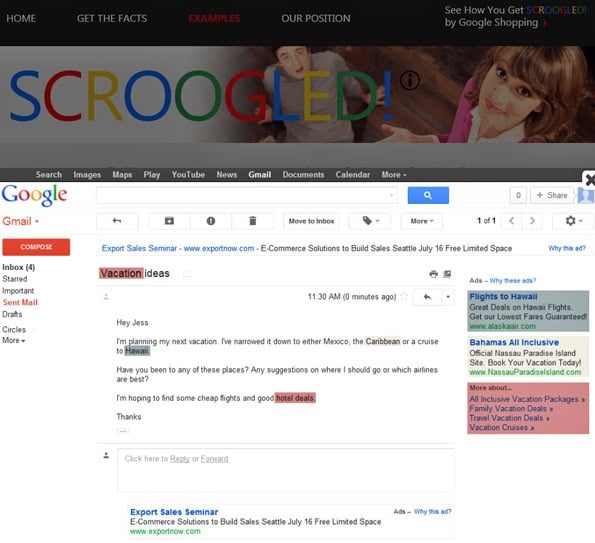Microsoft Assaults Gmail with "Scroogled" Smear Campaign
Google's privacy practices have come under fire in the past six months; the company was fined for continuing to track Safari users after previously promising not to do so. Last fall, Microsoft launched a campaign against Google's shopping search, informing users that Google no longer displayed relevant data, but ranked results by what advertisers were willing to pay to be in the top spot. Now, Redmond is expanding the claim to Gmail and informing users that they've been "Scroogled."
"If you’re a Gmail user, Google scans all of your sent and received messages, extracts keywords that they think are relevant to you, and then uses that data to target you with ads," the company claims at Scroogled.com, before inviting fed up users to switch over to Outlook.com instead.
Microsoft isn't miscategorizing Google's activity here. It's true that Google scans your email for key phrases and words it can then use to target advertising. It's also true that while the company claims it anonymizes this data, the benefit of such anonymity is questionable. Researchers have proven that "anonymized" data can be turned back into PII (personally identifiable information) if the data set is sufficiently detailed. As a simple example: If you know my IP address and can track the push updates sent to my phone, you can build a model of where I live and spend my time. Figure that out, and you know where I live -- and from there, you know who I am.

There probably are people who aren't aware that Gmail tracks user email for advertising purposes, but Google has never been particularly coy about the practice and it's been going for years. The original pitch for Gmail raised the hackles of privacy experts who were concerned that the service would erode user privacy. It's also true that Google scans the emails people send to a Gmail recipient, even if those users have never agreed to Google's privacy policy.
But none of this is new. Gmail has hundreds of millions of users, a huge database of information on all of them, and broad powers to recombine and cross-reference that data to target its advertising. If the privacy implications bothered people, the service would've been abandoned long ago. Microsoft's Scroogled campaign is a clever play on words, but it's unlikely to drive much traffic over to Outlook.
"If you’re a Gmail user, Google scans all of your sent and received messages, extracts keywords that they think are relevant to you, and then uses that data to target you with ads," the company claims at Scroogled.com, before inviting fed up users to switch over to Outlook.com instead.
Microsoft isn't miscategorizing Google's activity here. It's true that Google scans your email for key phrases and words it can then use to target advertising. It's also true that while the company claims it anonymizes this data, the benefit of such anonymity is questionable. Researchers have proven that "anonymized" data can be turned back into PII (personally identifiable information) if the data set is sufficiently detailed. As a simple example: If you know my IP address and can track the push updates sent to my phone, you can build a model of where I live and spend my time. Figure that out, and you know where I live -- and from there, you know who I am.

There probably are people who aren't aware that Gmail tracks user email for advertising purposes, but Google has never been particularly coy about the practice and it's been going for years. The original pitch for Gmail raised the hackles of privacy experts who were concerned that the service would erode user privacy. It's also true that Google scans the emails people send to a Gmail recipient, even if those users have never agreed to Google's privacy policy.
But none of this is new. Gmail has hundreds of millions of users, a huge database of information on all of them, and broad powers to recombine and cross-reference that data to target its advertising. If the privacy implications bothered people, the service would've been abandoned long ago. Microsoft's Scroogled campaign is a clever play on words, but it's unlikely to drive much traffic over to Outlook.

